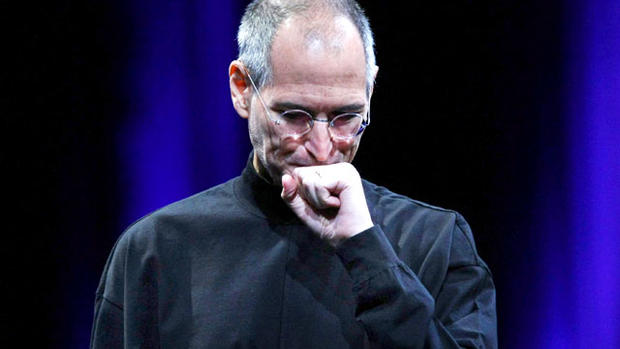Pancreatic cancer eyed in Steve Jobs' death
(CBS/AP) What killed Apple's visionary founder and CEO Steve Jobs? Neither his company nor his family have disclosed the cause of death, but medical experts not involved in his care suspect his cancer had returned.
Pictures: Pancreatic cancer spotlighted by Steve Jobs' death
Steve Jobs had battled a rare type of slow-growing pancreatic cancer for more than seven years. Medical experts say his need for a liver transplant two years ago signaled that his cancer had likely returned or spread. They said his death could have been from cancer, his new liver not working, or complications from immunosupressive drugs that prevent organ rejection.
Jobs declared he was cured in 2004, following surgery for a so-called islet cell neuroendocrine tumor. That rare form of pancreatic cancer is considered more treatable than the form of the disease that killed actor Patrick Swayze in 2009.
"Neuroendocrine tumors are uncommon, with only a few thousand cases a year," Dr. Craig Devoe, a pancreatic cancer expert at North Shore-LIJ Health System in New Hyde Park, N.Y, told HealthDay. Devoe speculated that fewer than 1,000 of these cases strike the pancreas. Overall, there are about 43,000 cases of pancreatic cancer each year, which kills nearly 38,000 people.
Treatment options vary but include chemotherapy, hormone therapy, and surgery to remove the tumor or surrounding tissue.
A liver transplant can cure Jobs' type of cancer, but "if it were to come back, it's usually in one to two years," said Dr. Michael Pishvaian, a gastrointestinal cancer specialist at Georgetown University.
Intensely private, Jobs never revealed whether the cancer had spread to his lymph nodes or liver, or the extent of his surgery. Some doctors speculated he had a Whipple procedure, in which a portion of the pancreas and small intestine, the gallbladder, and in some cases part of the stomach are removed and the remaining organs are reattached to allow for digestion.
"It is a big operation but it can be performed very safely by experienced surgeons at experienced centers," said Dr. Steven Libutti, director of the Montefiore-Einstein Center for Cancer Care in the Bronx.
Jobs was dramatically thinner in the years following the procedure. In January 2009, he attributed those problems to a hormone imbalance and said there was a simple treatment for it. Weeks later, he went on medical leave and then had a liver transplant, which was kept secret for two months.
At the time, Jobs would not say why the transplant was needed, though doctors speculated that the likely explanation was that the cancer had spread to his liver.
People with cancer typically don't undergo transplant surgeries, but "there is some support for the idea that a liver transplant can be curative" for a neuroendocrine tumor as long as the cancer has not spread beyond the liver, Pishvaian said.
Patients with neuroendocrine tumors that have spread survive on average for seven to eight years, but some patients have lived an additional 20 to 30 years, said Dr. Martin Heslin, cancer surgery chief at Vanderbilt University.
Sadly for Jobs, this was not the case - this past January, he announced his third and final leave of absence, and resigned in August, CBS News reported.
"I have always said if there ever came a day when I could no longer meet my duties and expectations as Apple's CEO, I would be the first to let you know," Jobs wrote Apple's board of directors on August 24. "Unfortunately, that day has come."
Memorial Sloan-Kettering Cancer Center has more on pancreatic neuroendocrine tumors.


